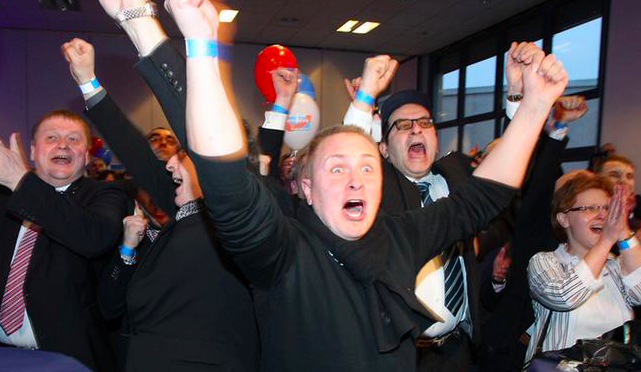Angela Merkel continues to reap the whirlwind. In this weekend’s elections Alternative für Deutschland (AfD) has emerged as the fastest-growing political insurgent party since 1945. It has managed to enter all three state parliaments – with over 10pc of the vote in Baden-Württemberg, Rhineland-Palatinate and almost a quarter of the vote in Saxony-Anhalt, more than double the centre-left SPD. It focused its campaign as a protest against Merkel’s migrant policy, a policy that paid off. Its success is more than just another example of Europeans letting off steam.
Imagine if Nigel Farage declared that police should be ready to shoot migrants trying to make it from Calais to Britain; saying: ‘I don’t want to do this, but the use of armed force is there as a last resort.’ And imagine that in spite of this — or perhaps because of it — Ukip were to overtake the Labour party in a national poll to become the most popular opposition party.
This, in effect, is what is happening in Germany. The words above were spoken by Frauke Petry, AfD’s leader. So while the possibility of Brexit dominates the news here, a bigger story is brewing in Europe: the EU’s inability to respond to this immigration crisis is sending millions of voters to extremists, now on the march across the continent. In unemployment-hit Saxony-Anhalt : AfD took almost a quarter of the vote. And look at the swings (bottom row), in all three states. AfD is in blue.
Merkel’s CDU has now lost its former stronghold of Baden-Württemberg – at the hands of the Greens, who took the protest vote. AfD is similar to Ukip, but its rise has been much swifter. It was founded by academics during the euro crisis three years ago. Last year its Eurosceptic founders were ousted and it evolved into an angrier anti-immigration party. But, unlike Ukip, it’s a party that can be unhesitatingly described as sinister. “We have a very clear position on the refugee policy: we don’t want to take in any refugees,” AfD deputy chairman Alexander Garland has said tonight. Even Ukip calls for Britain to take in more Syrian refugees.
Here, we fret over the colour of the front doors of the houses in which asylum-seekers are housed. In Germany last month, a small crowd gathered in the town of Bautzen to cheer as a building that was being prepared as a hostel for migrants burned to the ground.
Meanwhile, a mob surrounded a coach taking refugees to a hostel in Clausnitz near the Czech border. When the refugees were reluctant to disembark, police dragged some of them out of the bus and to the hostel. The scenes, captured on video, should chill the blood of any European.
No wonder German politicians claim the ‘police can’t cope’. Sickeningly, there were 920 attacks on refugee hostels in Germany last year.
All this might come as a surprise to Britons who remember residents of Munich gathering at the city’s railway station last September to cheer newly arrived migrants, shortly after Angela Merkel had announced that anyone who made it to Germany would be welcome to stay. Germany appears to be swinging from one extreme to the other.
The Prime Minister said this week that Britain must stay in the EU because the country would struggle to negotiate a better trade deal with Brussels in two years’ time. But by then, it is far from clear that there will be an EU at all.
REFERENDUM 2016: THE BATTLE AHEAD
Join Isabel Hardman, James Forsyth and Fraser Nelson at the ICA, near Trafalgar Square, to discuss the campaign with Ben Page, pollster at Ipsos Mori. A subscriber-only event. To book, click here. To subscribe from £1/week, click here.









Comments